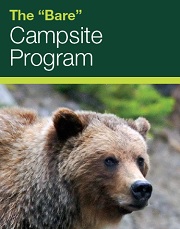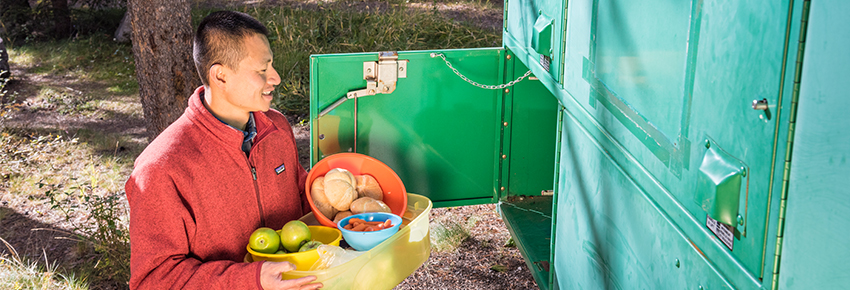
The "Bare" Campsite Program
Bears in the mountain national parks
Welcome! You are camping in a very special place, a national park.
We share this landscape with animals that depend on it for their survival. These animals can include black bears and grizzly bears, cougars, wolves, coyotes, squirrels, and birds.
Parks Canada’s “Bare” Campsite Program is in place for your safety and to help keep the animals in the national parks alive and wild. Campers and park staff are responsible for ensuring that wildlife attractants are never left unattended in campgrounds.
Keep a clean campsite!
Animals need to find their own natural food sources, not yours. By feeding an animal or leaving your scented food items unattended, you attract it to roadsides, picnic areas and campgrounds. This is dangerous for you and for the animals.
By camping in a national park, you agree to store all food and scented items in:
- A hard-sided vehicle, trailer, or motorhome.
- A campground food storage locker.
You must not leave food and scented items in an open, screened-in, or soft-sided shelter such as:
- A tent
- An open back of a truck
- A dining shelter
- A tent trailer
- An oTENTik
This rule applies whenever food and scented items are not in use, such as times like:
- At night while you are sleeping; or
- when you are away from your site for any length of time.
When away from your site, you may leave out your camping furniture (e.g. lawn chairs, lanterns, and tents).
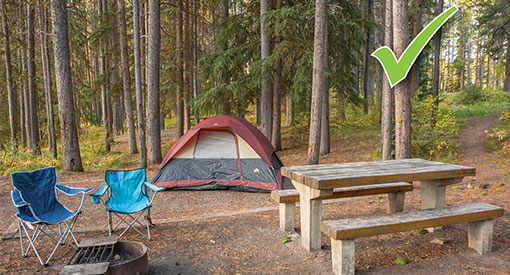
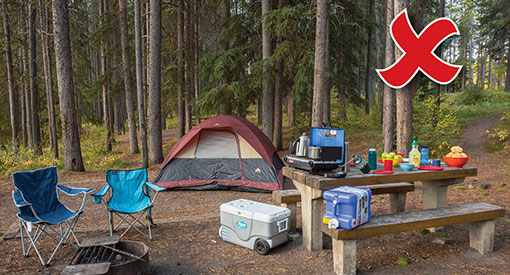
If your campsite is NOT clean:
Park staff will be patrolling the campground regularly to ensure that campers have not left anything out at their site that could attract wildlife. If you come back to your site and items you have left unattended are missing, look for a written notice left by park staff. It will contain further instructions.
If you fail to comply with the requirements of the “Bare” Campsite program, you may have your camping permit cancelled with no refund. You may also be charged under the Canada National Parks Act and Regulations.
By camping in a national park, you agree that:
Parks Canada staff may enter open and plainly visible areas of an unattended campsite to remove and secure plainly visible wildlife attractants.
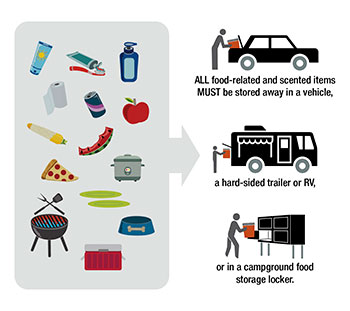
Animals can smell your food and scented items
Anything that has a smell or could be considered food may attract animals.
Never leave ANY of these items unattended:
- Food – open or closed.
- Garbage, including food scraps.
- Coolers – full or empty.
- Dishes and pots – clean or dirty.
- Pet food and bowls.
- Bottles and cans – full or empty.
- Barbeques and camp stoves – clean or dirty.
- Toiletries
- ANY item associated with food preparation.
Never dump wastewater on the ground
Don't drain it at water taps. Always dispose of your grey water in designated sinks, campground toilets or at a sani dump station.
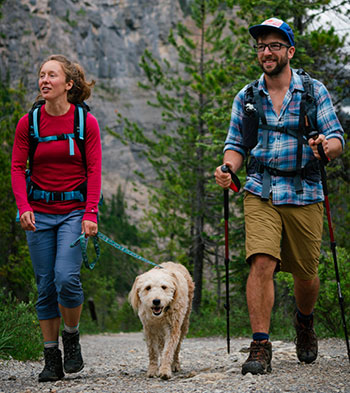
Attention pet owners!
Pets must always be kept on leash. Do not leave pets unattended outside. They can attract carnivores such as bears, cougars, wolves, or coyotes, and may be attacked.
![]()
You are camping within wildlife habitat
Animals rely on every part of this landscape for their survival. You may encounter them at any time.
Do the right thing!
- Always be aware of your surroundings, especially at dusk and dawn.
- Make noise and do not walk around alone.
- Carry bear spray and know how to use it.
- Never leave any food or scented items around your campsite.
Be safe when viewing wildlife
Seeing wild animals in the park can be a thrilling and rewarding experience, but remember:
- All wild animals can be dangerous.
- It is illegal to approach, feed, or entice wildlife of any kind – regardless of size.
- Only stop when and where it is safe to do so. Pull over and do not block traffic.
- Stay in your vehicle.
- Watch for a few moments, take a photo from a safe distance, and move on.
- Always keep a safe viewing distance (30-100 metres).
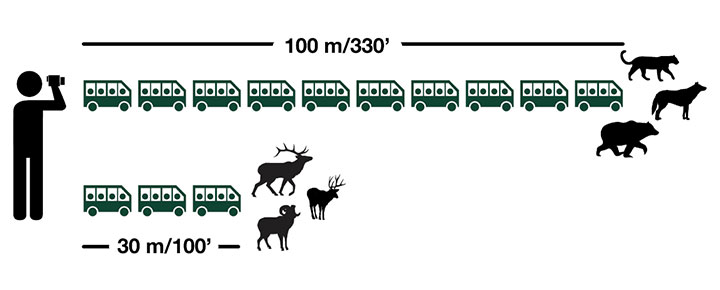
Report all bear, cougar, and wolf sightings to park staff immediately.
Banff, Kootenay and Yoho Park Dispatch: 403-762-1470
Jasper, Mount Revelstoke and Glacier Park Dispatch: 780-852-6155
Waterton Lakes Park Office: 403-859-5133
To learn more about bear safety, visit the Parks Canada Bear Safety website.
- Date modified :
